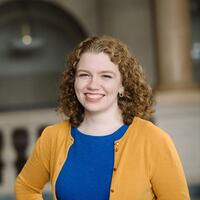Wright State Boonshoft School of Medicine is responsible for academic and quality oversight for multiple local health systems, including Kettering Health, said WSU spokesman Seth Bauguess. The residents must abide by the health systems’ policies as a condition of their residency.
Bobay’s attorney, Thomas W. Connors of Canton, said Bobay was about to be terminated from the program when a federal judge, Walter Rice, intervened and granted a temporary restraining order. Kettering Health later accepted the exemption, and the case was settled out of court, Connors said.
Kettering Health declined to comment.
Bauguess said the suit had since been dismissed because it had been settled out of court. Bobay was never terminated by Wright State University in any capacity, he said.
“Because Kettering reversed their decision and provided him with an exemption, no further action has been taken and the resident has not been dismissed from his residency program,” Bauguess said.
In an exemption form dated Aug. 14, 2021, Bobay wrote, “It is my deeply held religious belief not to get the COVID-19 vaccination. Any further questions will be directed to my lawyer.”
He later submitted additional information on Nov. 11, citing the use of fetal cells in the creation of some of the COVID-19 vaccines and his belief, “my body is the Temple of the Holy Spirit based on John 14:15-18...”
While the Johnson & Johnson vaccine used some fetal cells taken from an elective abortion in 1985 and either an elective abortion or miscarriage in 1973 to create the vaccine, the Pfizer and Moderna vaccines did not use fetal cells, according to the Los Angeles County Health Department. The vaccines themselves do not have any aborted cells in them, the Centers for Disease Control has said.
On March 2, 2021, the U.S. Conference of Catholic Bishops suggested concerned Catholics should choose Moderna or Pfizer vaccines over Johnson & Johnson when possible, but said, “While we should continue to insist that pharmaceutical companies stop using abortion-derived cell lines, given the world-wide suffering that this pandemic is causing, we affirm again that being vaccinated can be an act of charity that serves the common good.”
A third denial on Dec. 2 to Bobay said, “As we previously communicated to you, your exemption request was reviewed and denied twice per our established process because your stated reasons for requesting an exemption do not meet the standard for a religious exemption.”
Judge Rice said during his ruling, granting the temporary restraining order, “I’m fairly certain the law does not require the person seeking the religious exemption to prove by any standard of proof the sincerity of his request.”
About the Author
